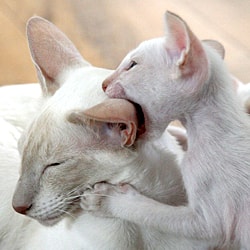WHY DO CATS BITE WHEN BEING PETTED
Your cat bites when you pet him\her ?
 Cats are no different to humans when it comes to personality. Some — complaisant and allow themselves to be petted as much as the master desires. Others — meet affection with aggression. And if they get bored, they will «escape» their master’s «grasp» or even bite (suddenly, for no apparent reason). And it confuses a lot of people why a cat thrilled with pleasure while being petted suddenly shows such aggression.
Cats are no different to humans when it comes to personality. Some — complaisant and allow themselves to be petted as much as the master desires. Others — meet affection with aggression. And if they get bored, they will «escape» their master’s «grasp» or even bite (suddenly, for no apparent reason). And it confuses a lot of people why a cat thrilled with pleasure while being petted suddenly shows such aggression.
So why do cats bite when being petted?
It turns out that such aggression has a name — aggression caused by the affection (scientific name: Overstimulation (Petting-Induced) Aggression).
Experienced cat owners can recognize in advance the imminent threat and avoid trouble of being bitten.
Once you start to pet a cat, scratching behind its ear, it immediately responds to your affection, begins to purr. But suddenly the cat changes its behavior. He begins to stiffen, twist his head in different directions or alternatively freeze. These subtle changes in the behavior of the cat should be a signal of impending danger.
If you continue to pet the animal, the cat will scratch or bite you.
As soon as you notice the first signs of strange behavior of a cat when you pet it, do not attempt to calm the cat with gentle caresses. The process of aggression, caused by excessive affection, is already running. And it is better to leave the animal alone.
So why do cats sometimes show aggression towards their owner, who behaves peacefully?
There are several theories that explain such behavior:
-
Socialization.
A cat can be aggressive during the affection, if it is not used to socialization. In other words, the cat is not accustomed to caresses, was never held in the arms or petted as a kitten. Or this happens if the kitten grew up alone, without a human presence.
-
The sensitivity threshold.
According to this theory, cats react differently to caresses. Some cats like light stroking and weightless touch, while others like a more intimate contact. But either way, when they had enough, they would love to just say «stop it», but not being able to speak they resort to biting and scratching.
-
Pain.
If your cat usually doesn’t bite and patiently endures all the affection, and now suddenly shows aggression when being petted — perhaps the cat is in pain, and you just stroked the sore spot. Pay close attention to your cat’s behavior, and when it calms down, try stroking her again.
-
The sudden awakening.
When you caress a cat, it can relax and fall asleep, even if cat’s eyes are open. Cat, being disoriented by sudden awakening, will not immediately realize what is going on, it may think that you attacked it. Naturally, the response will be aggression on its part.
-
Control and independence.
Proponents of this theory believe that this aggressive behavior caused by an attempt to keep control of the situation. In other words cat decides itself, when you can and cannot pet it.
Same with independence. Cat bites when you caress it, showing you that it doesn’t need your care. The cat emphasizes its leadership (dominant) position.
WHY DO CATS BITE WHEN BEING PETTED
Cats may bite when petted for a variety of reasons. Some cats enjoy being petted for short periods of time, while others may become overstimulated or uncomfortable after being petted for too long. When a cat feels overstimulated, they may become agitated and bite as a way to communicate their discomfort. Similarly, if a cat is in pain or has an underlying health issue, they may react negatively to being petted.
Additionally, some cats may bite when petted as a form of play or to initiate play. This behavior is often seen in kittens, who are still learning appropriate play behaviors and may not yet have developed good bite inhibition.
It’s important to pay attention to your cat’s body language and behavior while petting them. If your cat begins to show signs of discomfort or agitation, such as flattening their ears, twitching their tail, or trying to move away, it’s best to stop petting them and give them some space. If your cat’s biting behavior persists or becomes aggressive, it’s a good idea to consult with a veterinarian or animal behaviorist to rule out any underlying health issues or behavioral problems.